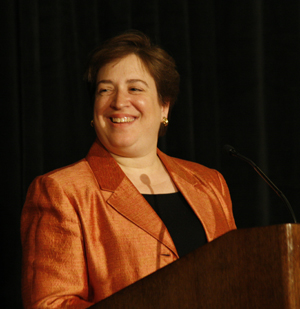Elena Kagan's Journey to the Supreme Court
An SDSU political science professor talks about the newest nominee to the bench.

As Elena Kagan is on the brink of becoming the newest Supreme Court Justice, many questions have risen about the 50-year-old solicitor general. Everything from Kagan’s personal life to her political track record is being scrutinized as she becomes more prominent in the public eye.
San Diego State political science professor Madhavi McCall, who specializes in judicial politics and women on the bench, addressed some of the topics surrounding Kagan, starting with her political career.
Not liberal enough?
Kagan has faced some criticism from the left for not being liberal enough, something McCall said is a fair consideration. However, she said it might be a strategic move on President Obama’s part as 2010 midterm elections approach.
“He could have nominated someone more liberal, but then there might have been a political cost to pay,” McCall said. “It’s easier for a more moderate liberal with less of a track record to get a quick vote, avoiding defeat before the midterm elections.”
But McCall also pointed out that Kagan clerked for Supreme Court Justice Thurgood Marshall, who was known for being a staunch liberal. She believes this suggests that Kagan will live up to the expectations that President Obama has for her.
“Even though she doesn’t have the paper trail one might anticipate, at this point, she’ll probably be a reliable member of the liberal coalition.”
Youngest Supreme Court Justice
If Kagan is confirmed, she would be the youngest member of the Supreme Court, which means a theoretically long tenure. McCall predicts that she will deal with many big issues, including separation of church and state—which has taken prominence in the Supreme Court—technology affecting privacy standards and abortion rights.
This last issue may not see much change, as Kagan is not changing the composition of the court, McCall said, but should that composition change in the future with Kagan still serving as a justice, it could affect abortion issues.
Lack of judicial experience
All of these cases require experience and good judgment, and the fact that Kagan has never served as a judge has been a point of contention for some.
“Lacking judicial experience is not the norm for a Supreme Court Justice; there’s a reason people want them to have some experience," McCall said. "However, she’s a well-trained lawyer and is very knowledgeable about constitutional law. The pros are that she could bring a different perspective and point of view that a judge might not have.”
Though several nominees without judicial experience have been confirmed in the past, McCall does not believe it is or will become the norm.
Third woman on the bench
Some also believe that her gender might bring a different perspective to the Supreme Court, one that may benefit women’s issues.
“There is some research showing that women have different behavorial and decision-making tendencies than men," McCall said. "Assuming they do, Kagan’s nomination could benefit women’s rights issues, particularly since she is a female appointed by a Democratic president. One presumes that she might be pre-disposed to supporting women’s rights.”
If nominated, Kagan would be the third female justice currently on the bench.
“I think it’s very exciting that we’re looking at the third woman in the Supreme Court," McCall said. "Even though there isn’t a consensus on whether or not women are more liberal than men, women do bring a different style of dealing with colleagues. Justices O’Connor and Ginsberg, for instance, are known as being more collegial.”
Final steps
In the coming weeks, Kagan will continue to meet with senators from across the country as she gets ready for the senate confirmation hearings. There she will answer questions from the senate judiciary committee, who will then make a recommendation to the full senate. She will need a senate majority vote in order to be confirmed.



